

Developing Your Child's IEP: The Parent's Role. If you’re new to the Individualized Education Program () process, you may wonder what your role is and how much you can offer.
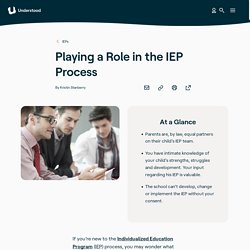
Remember this: You may not be an expert about , but you are an expert about your child. It’s not always easy to speak up about what your child needs. Understanding the special education services available to your child can boost your confidence. This may take time. But gathering information and asking questions along the way can yield big dividends for your child. How can you be involved in developing, monitoring and revising your child’s IEP? Parents are equal members of the IEP team. As a parent, you have the right to participate in all of your child’s IEP meetings. Guide to the Individualized Education Program. 1.
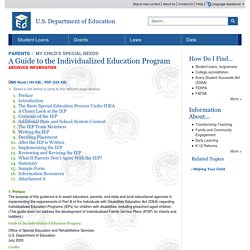
Preface The purpose of this guidance is to assist educators, parents, and state and local educational agencies in implementing the requirements of Part B of the Individuals with Disabilities Education Act (IDEA) regarding Individualized Education Programs (IEPs) for children with disabilities, including preschool-aged children. (This guide does not address the development of Individualized Family Service Plans (IFSP) for infants and toddlers.)
Guide to the Individualized Education Program Office of Special Education and Rehabilitative Services U.S. Credits This guide was developed by the U.S. Editor: Lisa Küpper, NICHCY Production: Jean Kohanek, NICHCY Disability Art: Madison, Moore, www.disabilityart.com Additional copies of this guide are available from: ED Pubs Editorial Publications Center U.S. . (877) 4-ED-PUBS (877) 576-7734 TTY (301) 470-1244 Fax This document is also available online at: MS Word (145K) Ten Common Mistakes Parents Make During the IEP Meeting. Ten Common Mistakes Parents Make During the IEP Meeting by Matt Foley, M.Ed., L.P.C.
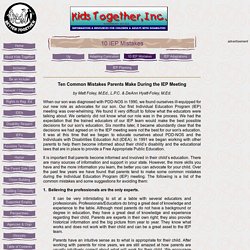
& DeAnn Hyatt-Foley, M.Ed. When our son was diagnosed with PDD-NOS in 1990, we found ourselves ill-equipped for our new role as advocates for our son. Our first Individual Education Program (IEP) meeting was over-whelming. We found it very difficult to follow what the educators were talking about. We certainly did not know what our role was in the process. It is important that parents become informed and involved in their child’s education. 1. It can be very intimidating to sit at a table with several educators and professionals. 2. Any request a parent makes needs to be in writing. 3. All sections of the Procedural Safeguards are important to parents.
A description of the action proposed or refused. We have found many instances where a parent requests an assessment or service only to have the IEP team tell the parent it cannot be done. All About the IEP. In Spanish | En español A legacy resource from NICHCY When a child receives special education services under the Individuals with Disabilities Education Act (IDEA), he or she must have an Individualized Education Program (IEP).
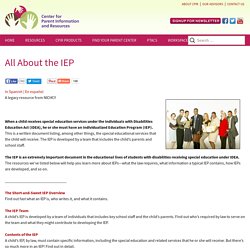
This is a written document listing, among other things, the special educational services that the child will receive. The IEP is developed by a team that includes the child’s parents and school staff. The IEP is an extremely important document in the educational lives of students with disabilities receiving special education under IDEA. The Short-and-Sweet IEP Overview Find out fast what an IEP is, who writes it, and what it contains. The IEP Team A child’s IEP is developed by a team of individuals that includes key school staff and the child’s parents. Contents of the IEP A child’s IEP, by law, must contain specific information, including the special education and related services that he or she will receive. Developing Your Child’s IEP. PDF version En español | In Spanish by Theresa Rebhorn Being a parent is the most wonderful—and hardest—job in the world.
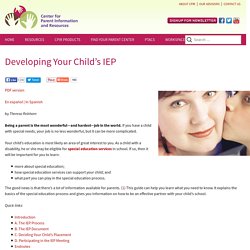
If you have a child with special needs, your job is no less wonderful, but it can be more complicated. Your child’s education is most likely an area of great interest to you. More about special education;how special education services can support your child; andwhat part you can play in the special education process. The good news is that there’s a lot of information available for parents. (1) This guide can help you learn what you need to know. Quick links: Introduction Thanks to a powerful and important federal law called the Individuals with Disabilities Education Act, or IDEA, children with disabilities are entitled to a “free appropriate public education” (often called FAPE). (2) This means that schools must provide eligible children who have a disability (3) with specially designed instruction to meet their unique needs at no cost to the children’s parents.